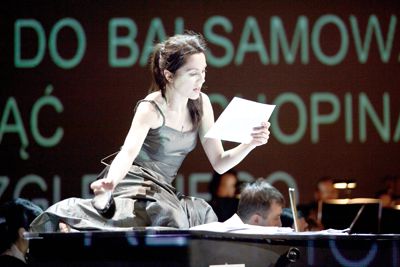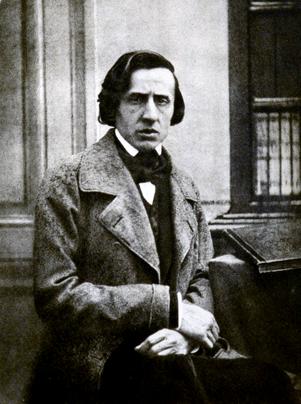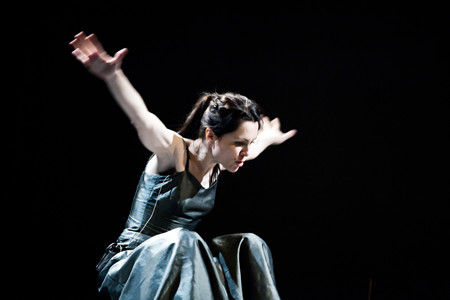Concert, Performance Art
Performed in Polish with English subtitles
Presented by Centrala
Directed by Michal Zadara
Featuring the Boston Conservatory Orchestra
Conducted by Franck Ollu
ArtsEmerson
Paramount Theater Mainstage
Washington Street, Boston
November 11-14, 2015
With Barbara Wysocka

in “Chopin Without Piano”
Photo:Natalia Kabanow
Courtesy of ArtsEmerson
One has to experience Barbara Wysocka’s phenomenal performance of this amalgamation of quotation, memoir, treatise, critique, fantasy to believe it. She speaks, declaims, the text of the performance with such intensity and rapidity, it’s almost impossible to imagine. It’s like a rap without pauses, or not too many of them. Apparently, the rhythm and pacing are all carefully mapped to the original solo piano part.
To hear Chopin’s piano concertos without the piano is pretty weird musically. I was sitting with a composer friend who leaned over to me and said the orchestration, by itself, doesn’t really sound like Chopin. It immediately struck me he was right, and that subliminally, when listening to these concertos with piano beforehand, I had recognized that. Here it was incredibly obvious, which made Wysocka’s solo verbal performance that much more distinctive, as though the orchestral part really were a kind of plainer frame, quite different in character from the main solo action.
With a running translation on a screen behind and above the onstage orchestra, the text indicates, in rapidly succeeding screens, what Wysocka is declaiming at lightning speed from perches around and about the piano which sits in the foreground on the left side of the stage as though it were actually being played.

Wysocka begins the performance sitting on the piano stool in deep concentration as though she were indeed a pianist preparing to play, and then she begins an amazing tour de force rappelle of a verbal cliff that goes on for the next ninety minutes, punctuated only by brief pauses between movements.
The full contents of both Chopin piano concertos are played, and, as each movement rolls by, one gets the distinct impression of a psychological scribe working from the music and an array of reference sources to create this fabulously complex mosaic of enunciations that somehow evoke the solo part that isn’t being played.
Wild, weird and wonderful at the same time, the intensity of Wysocka’s performance, and the sheer abundance of references and images, feels like a kind of Finnegan’s Wake that has a bit more verbal coherence but a good amount of the same kind of music. Here, that verbal music has a ferocity, directness and intensity that mimics the intensity of Chopin’s verve and spirit. What gets left out, one might argue, is some of the lilting Romanticism so crucial to Chopin. Yet, one understands why, here, in the interest of urgency and passion, the choice is to keep things moving at a ferocious clip.
Were the whole thing not such an amazing tidal wave of verbiage, anecdote, analysis and reaction, one might well argue that it was too uniformly explosive and not rhythmically varied enough. Yet, that criticism does not really come to mind in this case. The sense of overflowingness that is certainly central to Chopin comes out in this unusual performance, and in that way it really works. There is enough variation in the way Wysocka moves around the stage or on top of the piano, combined with some variation of sound via scratchy microphone or visuals via a video image projected on the raised piano lid, to keep things otherwise interesting.
Frankly, I can’t imagine Wysocka keeping up this regime night after night even for this short run, but it’s great for Boston audiences that she can and does.

in “Chopin Without Piano”
Photo:Natalia Kabanow
Courtesy of ArtsEmerson
– BADMan
Leave a Reply